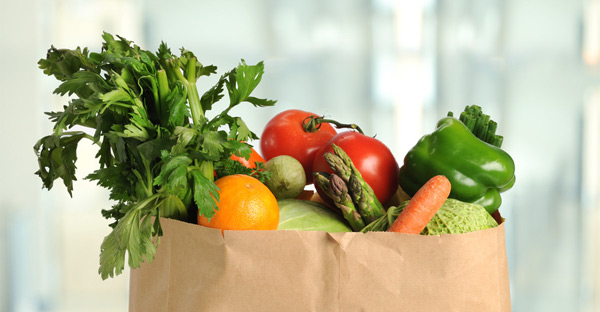

Fresh produce is part of a healthy eating plan and lifestyle. Storing produce properly is important. We go to the store and buy delicious-looking food, but then we get home and end up storing it improperly, or we get busy and forget about it. Then we find our refrigerator having the aroma of overripe or rotting fruits and veggies. One way we can spend less and eat healthier is by storing our fresh food properly.
Many times we go to the market and see all the beautiful, fresh fruits and veggies in season and on sale, and we over buy.
- Try to only buy what you truly feel you are going to eat in the next few days. Don’t try to buy produce to last for a week. It may not last that long. Some root veggies can last a month, if stored properly, but fresher, more fragile fruits and veggies will only last about 2-5 days. If you do buy too much, you can think about making a pie, or doing some canning, or freezing some of your more fragile fruits and veggies before they spoil.
- Store your food in its complete wholeness. When you pull fruits and vegetables apart, you break the cells. So, avoid breaking the skin and leave the stem intact.
- Do not place fruits and veggies in airtight bags, this will actually speed up decay. Compost or toss out any spoiled produce immediately as they can quickly spoil the whole group.
- Keep root veggies (including all kinds of potatoes) in a cool, dark, dry place. They can last up to a month if kept properly. Never store potatoes in the refrigerator, because they will develop much higher sugar content.
- Make sure you are storing the various types of fruits and veggies with the right partners. Some give off high levels of ethylene gas (a ripening agent), which makes them and everything around them ripen or decay quickly. Keep these types of foods separate from each other. Put things like kale and spinach in the same bin, and peaches and apples in another. If you put fruit with greens, it can cause the greens to rot or turn yellow in a few days. Greens are very sensitive to the ethylene gas.
I have a little product called an E.G.G. (Ethylene Gas Guardian, which is shaped like an egg), and it absorbs the ethylene. I just put it in my bin with the fruits and/or greens. Of course, if you need something to ripen faster, then you can use this knowledge to your advantage. You can put the item you need to ripen with a fruit that gives off the high level of ethylene gas. I also use produce bags by Bio-Fresh and Evert-Fresh. They absorb ethylene gas and help your produce stay fresher longer.
Ethylene Producing
These are high ethylene producers: apples, apricots, avocados, blueberries, cantaloupe, cherimoyas, cranberries, figs, green onions, guavas, grapes, honeydew, kiwifruit, mangoes, nectarines, papayas, passion fruit, peaches, pears, persimmons, plums, prunes, quince, and tomatoes. The banana is a high releaser, but should be stored in a cool dark place outside of the refrigerator.
Ethylene Sensitive
These are very sensitive to ethylene gas: asparagus, bananas (unripe), blackberries, broccoli, Brussels sprouts, cabbage, carrots, cauliflower, chard, cucumbers, eggplant, endive, garlic, green beans, kale, leafy greens, leeks, lettuce, okra, onions, parsley, peas, peppers, raspberries, spinach, squash, strawberries, watercress, and watermelon. Keep them separate from the high ethylene gas producing foods.
With all the fresh fruits and vegetables enticing us from their bins at the farmers’ market or grocery store, now we can make those delicious meals with our properly stored produce!
Copyright 2026 Center for Nutrition Studies. All rights reserved.
Deepen Your Knowledge With Our
Plant-Based Nutrition
Certificate
Plant-Based Nutrition Certificate
- 23,000+ students
- 100% online, learn at your own pace
- No prerequisites
- Continuing education credits









